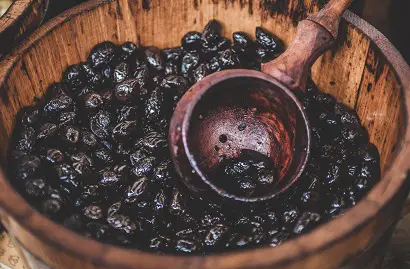When most of us think of culture in Greece, we imagine warm, sunny beaches with crystal clear blue waters. Some people even imagine themselves sitting in a seaside café watching locals gorge themselves on pita bread and a copious bowl of olives and olive oil. But is this stereotype true? Do Greeks eat a lot of olives?

It’s true, Greeks are notorious for eating many olives, whether the actual fruit or in the form of olive oil. In fact, olives and olive oil are so important to Greek culture that almost every meal incorporates them. This is due to their long history with the fruit, dating back to times when Olympian gods reigned supreme.
The love Greeks have for olives are not only clear by how much they eat them, but also by the expanse of various types.
How Important Are Olives to Greek Culture?
Olives are a staple food throughout the Mediterranean and Greece is at the helm of this. There is no Greek kitchen table or feast without a big, burgeoning bowl full of them. It is a staple in their diet and has been so since the times of ancient Greece.
Traditional Eating
Greeks used to eat olives for breakfast or a mid-morning snack. It would accompany something like herbal tea and bread. Once they discovered methods of pressing oil, it revolutionized Greek cuisine.
While Greeks veritably eat many olives, these delectable fruits are a reminder of deprivation and poverty. Many Greeks, in the past and today, associate it with the food of the poor because of its vast availability to villagers and farmers. These were not something people bought from a store since the land gave olives freely.
So, there was a time when people in the middle classes and upwards looked down on those who consumed olives. However, things are much different in the modern world. You’ll see them at fancy Greek restaurants and homes the world over.
Why Are Olives Synonymous with Greek Culture?
The Greek’s intrinsic connection to this fruit comes from an age-old story about the city of Athens and its genesis. Legend says that Athena, the goddess of wisdom, competed against her uncle. This was the god of the sea, Poseidon. Athena presented humanity with an olive tree while Poseidon presented the horse.
After testing out both for efficacy and practicality, the people of what we now call Athens determined the olive tree would better serve them. This is how Athens received its name and mainly why olives are so synonymous with Greek Culture.
Modern Christian Orthodoxy
However, these fruits are also important to modern Orthodox Christianity in Greece. More specifically, it’s the approved food during times of fasting, when people do not eat dairy. This practice further connects them to olives, not only by their history but also by their place in religion.
What Kinds of Dishes Incorporate Olives?
There are hosts of classic Greek dishes that incorporate olives in some way. However, people often serve it as its own food in whole fruit form. This makes for a nice appetizer, snack, or a finishing topper after a big meal. However, a few traditional dishes are worth mentioning:
- Eliopsomo (pronounced el-eeoh-ps-owe-mo): olive bread loaf from Crete
- Glyko Toy Koutallou (pronounced glee-co tee koo-tah-loo): sweet olive preserves
- Horiatiki (pronounced hore-ee-ah-tee-key): traditional village salad
What Are the Different Olives in Greece?
Greece burgeons with several different types and varieties of olives. The ones listed below are some of the most popular, but there are hundreds of others:
- Amfissa: This has a unique flavor as indicated by its lemony undertones. Excellent when paired with other olives, poultry dishes, and goat milk cheeses.
- Conservolia: Several varieties fall under this type of olive such as amphissa, agrinio, volos, stylida, and atalanta. These are very common but almost exclusively used in olive oil production.
- Halkithiki: Oval in shape, these green olives come from the Halkithiki region. It has a more meaty texture with a mild but hearty taste. They’re great on salads and other recipes.
- Kalamata: As the most popular black olive, these are what most people think of when idealizing Greek culture. They come from the Kalamata region of Greece, hence the name. They have a distinct almond shape and people often preserve them in a brine comprising salt, vinegar, and olive oil.
- Koroneiki: The high oil content in this olive provides a very distinct texture and flavor. So, this is another prized olive for its ability to make oil.
- Nafplion: This is the second-most popular olive in Greece. It’s green, plump, and round hailing from the Peloponnese in Nafplion. Brined in a blend of unique spices, water, and salt, they are perfect for salads.
- Throumba: These are branch-ripened olives cured with only olive oil and copious amounts of salt. These appear wrinkled because of the process. So, it’s advisable to soak them in more olive oil or water before consuming them to lower the high sodium content.
- Tsakistes: The word translates to “cracked,” which relates to this olive’s wrinkled appearance. Found in the region of Attica, these cures and season with fresh garlic and lemon.
Are There Health Benefits to Greek Olives?
The Mediterranean diet is a proven method for eating healthy and enjoying a long life. Olives are an integral part of that cuisine. Therefore, Greek olives have a plethora of health benefits. They have a high nutritional value, comprising some 25 compounds.
They are an excellent source of calcium, fiber, and antioxidants. Such components contribute to healthy digestion, cardiac activity, and blood circulation along with healthy skin, teeth, bones, and muscles. It also is a great anti-aging aid.
The only downside to them is that they tend to be higher in calories than most other fruits. On average, they are around 100 calories per 100 grams. But, high-oil ones, like Kalamata olives, will be as high as 200 calories. Also, their sodium content is through the roof but this depends on their bringing and/or curing.
- The Top Restaurants Specializing in Truffle Dishes - August 10, 2023
- Truffle Panna Cotta: A Decadent Dessert Recipe for Truffle Lovers - August 7, 2023
- Truffle Scrambled Eggs: A Luxurious Breakfast Delight - August 7, 2023








